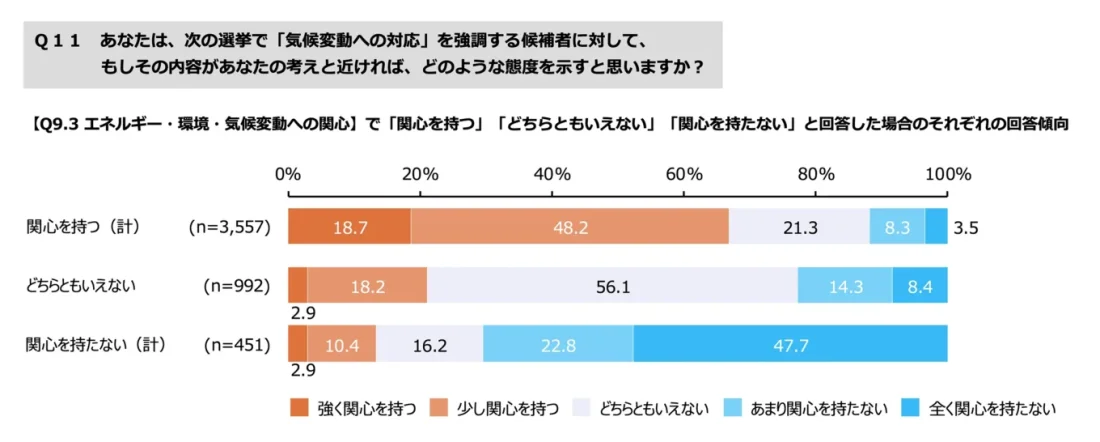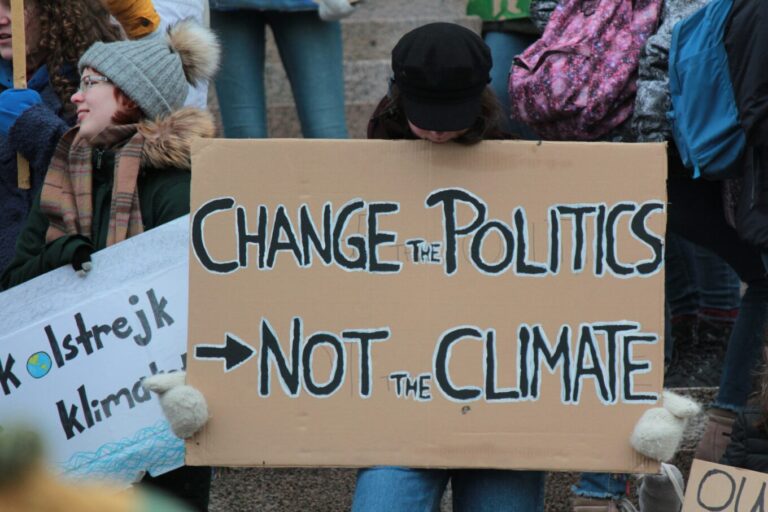Japan is experiencing yet another hot summer this year, with its hottest June on record, rising concerns about water shortages, and frequent localized heavy rains. It is clear that our daily lives are threatened by natural disasters caused by climate change, but how do Japanese people feel about climate change countermeasures?
In this article, JBC introduces two studies about Japanese people’s awareness of climate change.
According to a survey report released on April 18, 2025 by France-based Ipsos, the world’s largest public opinion research company, only 40% of Japanese people feel that individual action is necessary to address climate change, the lowest among the 32 countries surveyed. However, it also revealed that 81% of respondents expressed concern about the impacts of climate change, an increase of 12% from the previous survey in 2022, indicating that the climate change awareness of Japanese people is growing.
Another survey, released on May 26, 2025 by Japan Climate Alliance (JCA), showed 85.9% of respondents believe that climate change has had negative impacts on their personal lives, and 72.3% feel that the negative impact of climate change on their personal lives has increased over the past two to three years. Interestingly, 71.2% of respondents said they were “interested” in the issues of energy, environment, and climate change when choosing which candidate to support in the next election.
Ipsos “People and Climate Change 2025” Report
Ipsos conducted a study involving 23,745 people in 32 countries over a two-week period from the end of 2024 to the beginning of 2025, and compiled the results in the “People and Climate Change 2025” report. According to this survey, only 40% of Japanese people agreed with the statement, “If individuals like me do not act now to combat climate change, we will be failing future generations,” ranking Japan at the bottom of the list. The global average for this question was 64%, with the highest being 82%, recorded in the Philippines where they have repeatedly suffered damages from massive typhoons and floods.
On the other hand, 81% of Japanese people responded they were concerned to the question “How concerned are you, if at all, about the impacts of climate change that are already being seen in [Japan]?”, an increase of 12% from the previous survey in 2022. There is a growing trend of concern in countries facing significant risks from climate change, with 18 of the 27 countries surveyed showing an increase in concern. To the question asked “If [your country]’s government does not act now to combat climate change, it will be failing the people of [your country],” Japanese respondents showed the lowest agreement among the 32 countries (42%). This result suggests that there is little expectation for Japan’s government to take action on climate change.

JCA Survey on Elections and Climate Change: One in Three People Are “Climate Voters”
To explore the relationship between voters’ concern about climate change and their voting intentions, a nationwide survey of 5,000 people was conducted online by Japan Climate Alliance (JCA) from the end of April to May 7, 2025. In this survey, 33.1% of respondents said they were concerned about climate change and would vote in the next election. It also pointed out 72.3% of respondents feel that the negative effects of climate change have been growing in recent years. While this figure was also high in Ipsos’ study, the JCA survey delved deeper into the specific impacts respondents considered most severe. The results showed that “decreases in crop quality, harvest yields, and fish catches” (54.9%) were the most commonly cited concerns, followed by “rising living costs such as food prices and electricity bills” (44.4%).
Recently, rice prices in Japan have skyrocketed, and the government has announced plans to increase rice production starting with the FY2025 crop, but there are concerns that natural disasters could reduce production levels. Other foods are also facing reduced harvests due to heat stress and water shortages, and there is no end in sight for electricity price hikes. Given this situation, it is understandable that 71.2% of respondents indicated they would “pay attention” to “energy, environment, and climate change” when supporting candidates in the next election. Furthermore, among them, 66.9% (47.6% of all respondents) indicated they would support candidates in the next election who emphasized climate change as an issue.

Launch of the worldwide “89 Percent Project”
Both surveys indicate a low level of awareness of climate change issues in Japanese society, while also showing an increasing number of people calling for stronger climate change measures. In the United States, which once led the way in climate change measures, the second Trump administration is pushing policies that disregard science and prioritize fossil fuels, leading to a growing sense of resignation and hesitation to take action. In contrast, in Japan, young people are taking legal action to protect their future with the “Youth Climate Case Japan”.
It is also an important role of the media to appropriately convey topics related to climate change measures and the fight against climate change. Covering Climate Now (CCNow), a network of journalists working to strengthen climate reporting, has launched “The 89 Percent Project”, a collaborative reporting project that builds on a slate of recent scientific studies finding that between 80-89% of the world’s population want stronger climate action. In response to a study where 89% of 130,000 respondents agreed their government should strengthen measures against global warming, The 89 Percent Project aims to share the stories of people who, despite wanting their governments to make stronger efforts to address climate change, are unable to voice their opinions for various reasons (the silent majority). The results of the study also revealed that Japan has a significant silent majority, with 85.73% respondents expressing this view.
As the movement to make the voices of the silent majority heard gains momentum and accurate reporting becomes more widespread, it will become easier to discuss climate change measures. Once voters have gained scientific knowledge and are able to confirm how climate change issues are positioned in the platforms of election candidates, climate change measures will likely become one of the factors influencing their choice of candidate.
Related Links
PRESS RELEASE: As the world passes 1.5˚C average temperature increase, fewer feel individual action on climate change is needed
News : Global perceptions amid earth’s temperature breaching the 1.5 degrees tipping point
The 89 Percent Project (Link)

